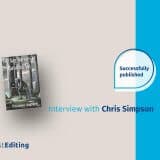
When writing, especially in a scientific journal, it is prudent to check which version of English should be used. There are not many differences between American and British writing. However, they are reflected not only in the spelling of some common words, but also affect the usage of certain expressions and grammatical rules. As the differences in spelling will automatically be picked up by the Word processor (assuming you selected “Check spelling and grammar,” of course), some finer differences in the use of grammar and style will not.
So, here are a few tips to help you deal with this issue.
- Use of past tense forms
Some verbs are commonly used in a different form in American (A) and British English (B), even though both are acceptable, such as:
Bust / bust (B) / busted (A)
Stink / stank (B) / stunk (A)
Wake / woke (B) / waked (B) etc.
- Use of auxiliaries and modals
In natural speech, British use “do” much more often than Americans do (as was just done here).
For example, British respond to the question, “Are you coming with me to the cinema?”
With “I might do,” while Americans would simply say, “I might.”
Similarly, in British English, “Need not” is often abbreviated to “needn’t,” while in American it is not.
For example, British would say, “You needn’t have bothered coming so late,” while American English would be something like, “You shouldn’t have bothered coming; it’s so late.”
Differences Between British and American Writing
- Use of “give” vs. “take.”
In British English, when speaking of various actions, such as showering, bathing, napping, etc., it is common form to say “have a nap/shower/bath.” While the Americans would say “take” instead, as in “She is taking a bath.” (To which the British/Australian English speaker might laugh, “Oh really, where is she taking it?”)
- Use of prepositions
There are many examples of differences in the use of various prepositions. But for brevity, we will focus on those likely to occur in ordinary speech.
– Use of “to.”
In American English, it is often omitted in sentences such as
(B) Promise to write to me every day.
(A) Promise to write me every day.
– Expressing difference using to/than
The sentence “This house is different from any one I have lived in so far,” can take the following forms:
(B) This house is different to any one I have lived in so far.
(A) This house is different than any one I have lived in so far.
- Differences in wording
Finally, British and American English also differ in some words and expressions. While the following examples are unlikely to arise in academic writing, they may still come handy in everyday life and will help avoid any misunderstandings.
British / American
Nappies/diapers
angry/ mad (in Britain, “mad” would mean crazy)
pissed (this means drunk in Britain and angry in the US)
In summary, the more familiar you are with the language, the more accustomed you will be with the finer nuances of its usage. So, if in doubt, seek professional editorial help!
Originally posted 8/11/2015 and happily updated 10/27/2017. Thanks for reading!










